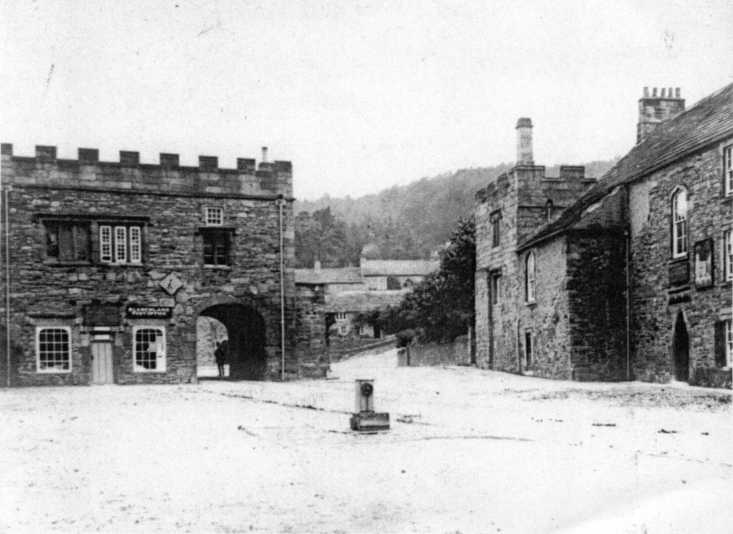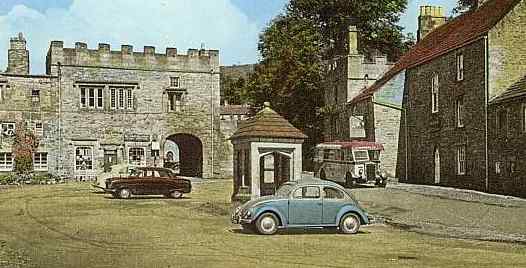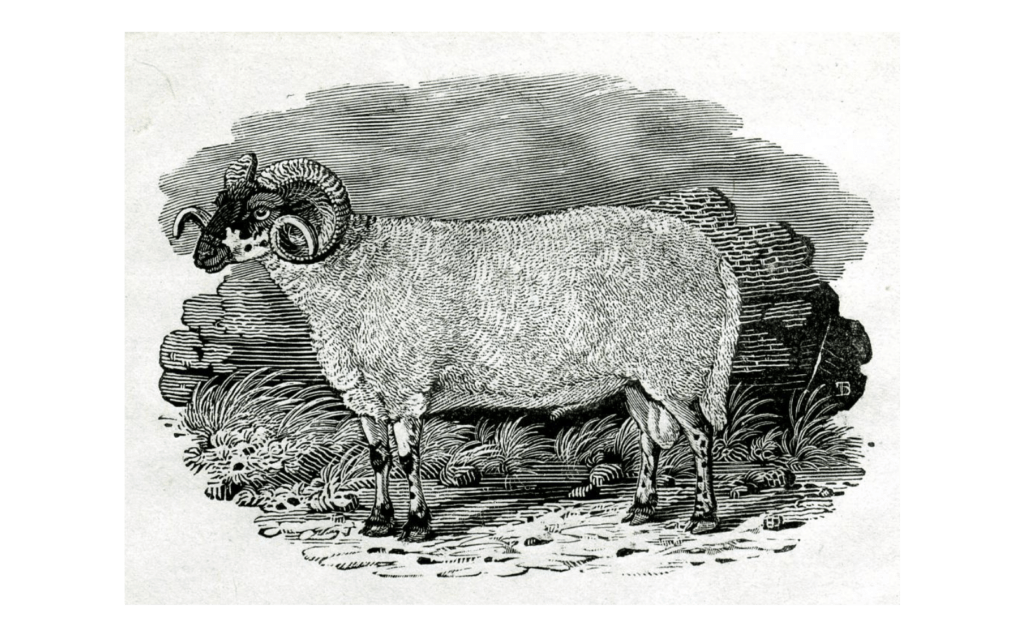Keeping law and order in the days before “The Poliss”
There’s nothing quite like the heartwarming twinkle of the Christmas tree lights outside the Lord Crewe Arms on a dark winter’s night to stir thoughts of years gone by and the people who have come and gone in Blanchland.
The Lord Crewe Arms was the setting for a Christmas Eve celebration that took place every year for more than a century and involved some of the most prominent people in the area – the annual dinner of the local Felons Association.
Its full name was the Blanchland and Hunstanworth Association for Prosecuting Rogues and Felons and it was one of many such groups to be founded up and down the country in the late 18th and early 19th Centuries to bring local criminals to justice.
A Northern Echo notice dated 1828.
The Felons Associations acted like small insurance organisations where members paid an annual subscription fee to have the financial weight of the Association behind them should they need it; if a case was brought before the Association, they could decide to offer a reward for information, pay for a policeman to investigate the incident, or buy the services of a solicitor to prosecute the wrongdoer.
A beautiful old ledger book deposited with Northumberland Archives by Audrey Morpeth (who passed away in 2011) shows almost 80 years of Association members’ subscriptions, the cases brought before them and even the brandy consumed over the Christmas Eve dinner table. It’s all painstakingly recorded by Audrey’s father Jonty Morpeth, his father Thomas and his father Jonathan before him, who were all secretaries of the Association in their time. Inscribed on the first page is the date the Association was formed – “Instituted the 24th day of December 1814.”
The ledger book itself begins in 1846 when the Felons Association has 30 paid-up members from the business and farming communities in the area. The two major landowners – the Lord Crewe Trust and Robert Capper of Newbiggin – each pay 8/4d (42p), while other members pay two shillings (10p)a year, including George Carr of Birkside, Mr Jasper Stephenson of Nookton and Mr John Brown of Pennypie House. Audrey’s Great-Great Grandfather, Thomas Morpeth of Fellgrove, is on the committee, which meets quarterly on the last Thursday of March, June and September.
Blanchland and Hunstanworth Association for the Prosecution of Felons and Rogues…
Special meetings would be called when incidents occurred for the Felons to discuss, as in January 1848: “…A quantity of apples having been stolen out of the Coach House of Mr Robert Forster. A guinea is offered to be paid on the conviction of the offender or offenders.”
Later that year, John Hutchinson is accusing George and Edward Bell of Cowbyer for “…taking a quantity of timber out of My Lord Crewe’s Plantation at the Hott Burn.” The Association members decide it’s a quarrel between families – a ‘domestic’ we’d term it today – and resolve to let them sort it for themselves.
Sometimes the situation is considered too serious for the Association – such as the 1851 report by Matt Keenlyside of High House of an assault against his son by John Jameson of Hunstanworth – and is left for the magistrates at Wolsingham to deal with.
The Felons were a busy lot in 1851: They met again that year when two stacks of hay were set on fire in the stack yard adjoining Blanchland. No-one had sheepishly come forward to admit it was an accident, so the Association has to assume the worst: “We the committee think it our duty to testify our abhorrence of any act of incendiarism, by offering a Reward of Five Pounds to any person who may give such information as may lead to the conviction of the offender or offenders before a Magistrate, if the same shall have been done wilfully.”
We possibly get an insight into the gradual shift in role and responsibilities from the Felons Associations to the developing police forces from two entries in the ledger.
In January 1854 the group meets to consider offering a reward “…for the conviction of the depridators which broke into the Vestry of Hunstanworth Church and stole threrefrom a sum of money amounting to £5 8 shillings between 7th and 9th of January last.”
The Association offers a £5 reward, and in addition they decide to offer to “defray one half of the expenses which might result from employing one of the Police force to make any examination into the circumstances attending it if the members of Hunstanworth Library will defray the other half.”
Five years later there’s a robbery from John Armstrong’s house in Blanchland – the £16 worth of stolen goods includes a silver watch, a gold ring, a silk shawl and handkerchiefs, a linen shirt and even a silver pencil case. It was an open and shut case – the robbery that is, not the pencil case…
“A person calling himself Thomas Chirton (who had been employed by the Government surveyors) had been lodging in [John Armstrong’s] house for a fortnight, decamped on the morning of Sunday the 2nd instant at five o’clock AM. For Riding Mill station on his rout for Newcastle upon Tyne, since then Mr A. has missed the property named…”
A receipt for the Felons’ annual dinner in 1909.
The Felons Association offers a £3 reward for the apprehension and conviction of the light-fingered civil servant. Hexham police superintendent George Stephenson catches Chirton and duly claims his £3. But it takes a few months for the Felons to cough up; in April 1860 – a full six months after the robbery – they tell him to put in a written claim for the reward, and the money is finally agreed in June. Perhaps by 1859 the Felons Association members regard it as the policeman’s job to catch criminals and don’t see why he should have the reward as well?
As the years go by, the Felons is less about calling petty criminals to account and more about having a good time at Christmas. Despite renaming themselves The Derwent Association and admitting members from Edmundbyers and further afield, their role as law enforcers diminishes. Over the following seven decades there are only two special meetings to keep law and order, one in 1866 and one in 1902; the most important decision the members have to make is what time the landlady of the Lord Crewe Arms should have the Christmas Eve dinner on the table.
So by the turn of the 20th Century the Felons Association was little more than a social club where locals gathered every December 24th for a slap-up meal at the Lord Crewe. A 1909 dinner bill shows 26 people enjoyed dinner that night, along with three gallons of bitter beer, three bottles of whiskey, two of rum, one of port and some tobacco to round the evening off with a pipe. And then out into the starry night, a pale full moon lighting the way home.










